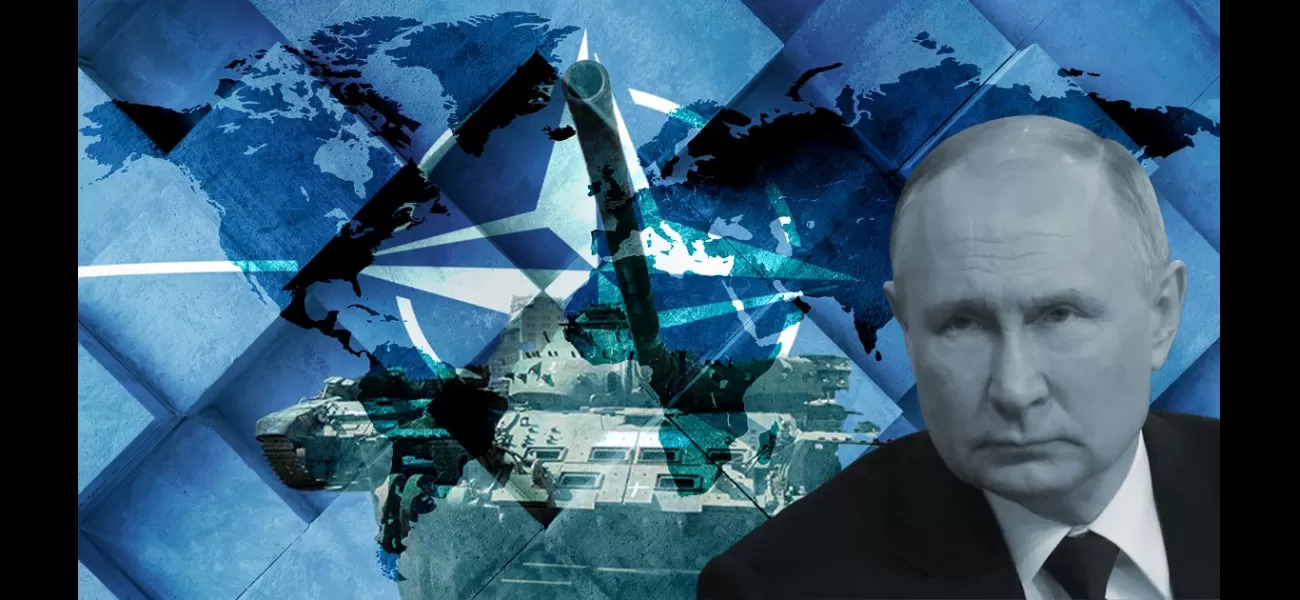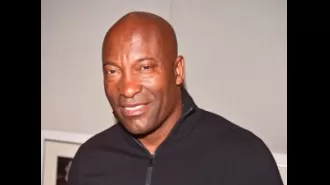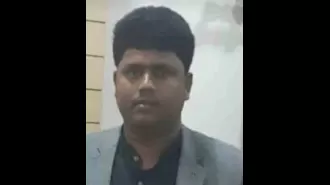Putin's cunning strategy is to slowly wear down his opponents and ultimately emerge victorious.
Military expert warns that Putin plans to expand his aggressive actions beyond Ukraine.
January 19th 2024.

The US Institute for the Study of War has shed light on Vladimir Putin's strategy to weaken Ukraine's international support. According to a leading analyst at the institute, Putin is trying to undermine the resolve of the West, as he knows that he cannot win a straight-up war if Ukraine's allies stand united.
George Barros, who works at the reputable institute, explained that the Russian president is using "information operations" to create divisions among Kyiv's allies. This, in turn, is causing a pivotal and precarious moment in the ongoing war between Russia and Ukraine, as Moscow attempts to turn the tide on the battlefield. Meanwhile, US politicians are locked in a debate over whether to send a multi-billion dollar arms package to Ukraine.
Barros warned that any acceptance of increased Russian aggression could lead to Putin expanding his "wars of conquest" further west. He emphasized the importance of Western support for Ukraine, saying that if the West stands decisively behind Ukraine, Putin's entire strategy will crumble.
However, the situation is currently in a delicate state, with Joe Biden's proposed $61.4 billion aid package for Ukraine stalled in Congress, and other allied nations decreasing their arms supplies. Barros believes that this is a critical time for decision-makers, as Putin is attempting to convince them that Ukraine's prospects for victory are slim, and the war is a never-ending money pit.
Even as Russian casualties continue to mount, Putin seems unfazed, recently visiting a military hospital in Moscow. Barros suggests that this is part of Putin's strategy to reinforce the idea that Ukraine is an unwinnable war and the American people cannot afford to keep sending aid.
The ongoing fighting in eastern and southern Ukraine has been grinding and resource-intensive, with Moscow expected to launch offensives in Kharkiv and other eastern regions. The Washington-based think tank predicts that these offensives will occur once the ground hardens, making it easier for mechanized warfare.
At the same time, Ukraine is facing a decrease in military aid from its western allies, such as German Leopard tanks and British Storm Shadow missiles. Barros believes that this is a crucial moment for both the war on the ground and the policy debate in the US.
He explains that the Ukrainians were unable to achieve their desired results from their counter-offensive last summer, and the Russian forces have since regained the initiative. However, the Ukrainians are working on establishing a lasting presence in Kherson on the southern bank of the Dnipro River.
Barros notes that the Russians have been conserving their forces, conducting rotations, and intensifying their attacks using glide bombs. He also mentions that over the New Year, there were indications that the attacks slightly decreased, possibly in preparation for a major offensive.
Barros believes that the optimum time for Russia to launch a new round of attacks would be a temporary window when the ground freezes before the spring thaw. This allows for maneuver warfare ahead of the spring months. However, it remains to be seen if Moscow will be successful, as even Russian milibloggers and military experts are skeptical about the outcome.
Despite the challenges faced by Ukraine, Barros remains cautiously optimistic about their chances of prevailing in the war. He believes that there are many lessons to be learned from the 2023 counter-offensive, and now, almost two years into the war, Ukraine has the necessary weapons systems to plan operations without being at a disadvantage.
Barros acknowledges that Ukraine faced challenges in the past, lacking decisive equipment such as F16s, sufficient vehicles, and long-range precision missiles. But now, they have these weapons, and they can plan their operations without any restrictions.
The US Institute for the Study of War has shed light on Vladimir Putin's strategy to weaken Ukraine's global support. According to a leading research analyst, Putin is aiming to break the unity of Ukraine's allies, as he knows that he cannot win a direct war if these allies stand together. George Barros, from the renowned institute, stated that Russia is using "information operations" to create division among Kyiv's allies.
Barros, who leads the Russia team, cautioned that the war between Ukraine and Russia is at a crucial and tense moment. Moscow is trying to turn the tide on the battlefield, while US politicians are struggling to pass a multi-billion dollar military aid package for Ukraine. This delay in aid, along with the decrease in arms supplies from other allied nations, is giving Putin an advantage.
"In the decision-making space, we are in a precarious time because Putin realizes that he can't win on the ground if the West stands firmly behind Ukraine," said Mr. Barros. "His entire strategy is based on undermining Western political resolve and convincing them that a Russian victory is inevitable or that the costs of supporting Ukraine don't outweigh the benefits." Putin's ultimate goal is to make the West cut its losses or negotiate, rather than continue to support Ukraine.
Barros believes that Putin's actions are also aimed at shaping the perspectives of Western decision-makers. By presenting a misleading narrative that Ukraine is an endless war and a "money pit", Putin is trying to discourage the West from providing military aid. He is also using this narrative to influence battlefield maneuvers, making it seem like Ukraine's chances of victory are slim.
Meanwhile, the fighting in eastern and southern Ukraine continues, with both sides suffering heavy casualties. The US-based think tank predicts that Russia will launch offensives in other regions once the ground hardens and becomes more suitable for mechanized warfare. At the same time, the amount of military aid from Western nations, such as tanks and missiles, has decreased.
"The war is currently at a pivotal and tense moment, both on the ground and in the policy debates in the US," Barros explained. "On the ground, Ukraine's counter-offensive last summer did not achieve the desired results, and their efforts have largely come to a halt. The Russians, on the other hand, have regained the upper hand and have been preparing for a major offensive."
Barros believes that the optimal time for Russia to launch a new round of attacks would be during the temporary freeze of the ground before the spring thaw. This allows for maneuver warfare, giving the Russians an advantage. However, it is unsure if they will be successful, as even Russian military experts are skeptical about their chances.
Despite the challenges, Barros remains cautiously optimistic about Ukraine's chances of success. He believes that they have learned valuable lessons from their 2023 counter-offensive and now have the necessary weapons and equipment to plan effective operations. "Only now, almost two years into the war, does Ukraine have the necessary weapons systems to fight without any limitations," he concluded.
In the midst of this tense situation, The Agency has launched a WhatsApp community for people to stay updated on the latest news and trends. This includes breaking news, showbiz stories, and must-watch videos from their website. So don't miss out and join the Metro WhatsApp community now by following the link and clicking on "Join Chat". Make sure to turn on notifications to be the first to hear the latest updates.
George Barros, who works at the reputable institute, explained that the Russian president is using "information operations" to create divisions among Kyiv's allies. This, in turn, is causing a pivotal and precarious moment in the ongoing war between Russia and Ukraine, as Moscow attempts to turn the tide on the battlefield. Meanwhile, US politicians are locked in a debate over whether to send a multi-billion dollar arms package to Ukraine.
Barros warned that any acceptance of increased Russian aggression could lead to Putin expanding his "wars of conquest" further west. He emphasized the importance of Western support for Ukraine, saying that if the West stands decisively behind Ukraine, Putin's entire strategy will crumble.
However, the situation is currently in a delicate state, with Joe Biden's proposed $61.4 billion aid package for Ukraine stalled in Congress, and other allied nations decreasing their arms supplies. Barros believes that this is a critical time for decision-makers, as Putin is attempting to convince them that Ukraine's prospects for victory are slim, and the war is a never-ending money pit.
Even as Russian casualties continue to mount, Putin seems unfazed, recently visiting a military hospital in Moscow. Barros suggests that this is part of Putin's strategy to reinforce the idea that Ukraine is an unwinnable war and the American people cannot afford to keep sending aid.
The ongoing fighting in eastern and southern Ukraine has been grinding and resource-intensive, with Moscow expected to launch offensives in Kharkiv and other eastern regions. The Washington-based think tank predicts that these offensives will occur once the ground hardens, making it easier for mechanized warfare.
At the same time, Ukraine is facing a decrease in military aid from its western allies, such as German Leopard tanks and British Storm Shadow missiles. Barros believes that this is a crucial moment for both the war on the ground and the policy debate in the US.
He explains that the Ukrainians were unable to achieve their desired results from their counter-offensive last summer, and the Russian forces have since regained the initiative. However, the Ukrainians are working on establishing a lasting presence in Kherson on the southern bank of the Dnipro River.
Barros notes that the Russians have been conserving their forces, conducting rotations, and intensifying their attacks using glide bombs. He also mentions that over the New Year, there were indications that the attacks slightly decreased, possibly in preparation for a major offensive.
Barros believes that the optimum time for Russia to launch a new round of attacks would be a temporary window when the ground freezes before the spring thaw. This allows for maneuver warfare ahead of the spring months. However, it remains to be seen if Moscow will be successful, as even Russian milibloggers and military experts are skeptical about the outcome.
Despite the challenges faced by Ukraine, Barros remains cautiously optimistic about their chances of prevailing in the war. He believes that there are many lessons to be learned from the 2023 counter-offensive, and now, almost two years into the war, Ukraine has the necessary weapons systems to plan operations without being at a disadvantage.
Barros acknowledges that Ukraine faced challenges in the past, lacking decisive equipment such as F16s, sufficient vehicles, and long-range precision missiles. But now, they have these weapons, and they can plan their operations without any restrictions.
The US Institute for the Study of War has shed light on Vladimir Putin's strategy to weaken Ukraine's global support. According to a leading research analyst, Putin is aiming to break the unity of Ukraine's allies, as he knows that he cannot win a direct war if these allies stand together. George Barros, from the renowned institute, stated that Russia is using "information operations" to create division among Kyiv's allies.
Barros, who leads the Russia team, cautioned that the war between Ukraine and Russia is at a crucial and tense moment. Moscow is trying to turn the tide on the battlefield, while US politicians are struggling to pass a multi-billion dollar military aid package for Ukraine. This delay in aid, along with the decrease in arms supplies from other allied nations, is giving Putin an advantage.
"In the decision-making space, we are in a precarious time because Putin realizes that he can't win on the ground if the West stands firmly behind Ukraine," said Mr. Barros. "His entire strategy is based on undermining Western political resolve and convincing them that a Russian victory is inevitable or that the costs of supporting Ukraine don't outweigh the benefits." Putin's ultimate goal is to make the West cut its losses or negotiate, rather than continue to support Ukraine.
Barros believes that Putin's actions are also aimed at shaping the perspectives of Western decision-makers. By presenting a misleading narrative that Ukraine is an endless war and a "money pit", Putin is trying to discourage the West from providing military aid. He is also using this narrative to influence battlefield maneuvers, making it seem like Ukraine's chances of victory are slim.
Meanwhile, the fighting in eastern and southern Ukraine continues, with both sides suffering heavy casualties. The US-based think tank predicts that Russia will launch offensives in other regions once the ground hardens and becomes more suitable for mechanized warfare. At the same time, the amount of military aid from Western nations, such as tanks and missiles, has decreased.
"The war is currently at a pivotal and tense moment, both on the ground and in the policy debates in the US," Barros explained. "On the ground, Ukraine's counter-offensive last summer did not achieve the desired results, and their efforts have largely come to a halt. The Russians, on the other hand, have regained the upper hand and have been preparing for a major offensive."
Barros believes that the optimal time for Russia to launch a new round of attacks would be during the temporary freeze of the ground before the spring thaw. This allows for maneuver warfare, giving the Russians an advantage. However, it is unsure if they will be successful, as even Russian military experts are skeptical about their chances.
Despite the challenges, Barros remains cautiously optimistic about Ukraine's chances of success. He believes that they have learned valuable lessons from their 2023 counter-offensive and now have the necessary weapons and equipment to plan effective operations. "Only now, almost two years into the war, does Ukraine have the necessary weapons systems to fight without any limitations," he concluded.
In the midst of this tense situation, The Agency has launched a WhatsApp community for people to stay updated on the latest news and trends. This includes breaking news, showbiz stories, and must-watch videos from their website. So don't miss out and join the Metro WhatsApp community now by following the link and clicking on "Join Chat". Make sure to turn on notifications to be the first to hear the latest updates.
[This article has been trending online recently and has been generated with AI. Your feed is customized.]
[Generative AI is experimental.]
0
0
Submit Comment





